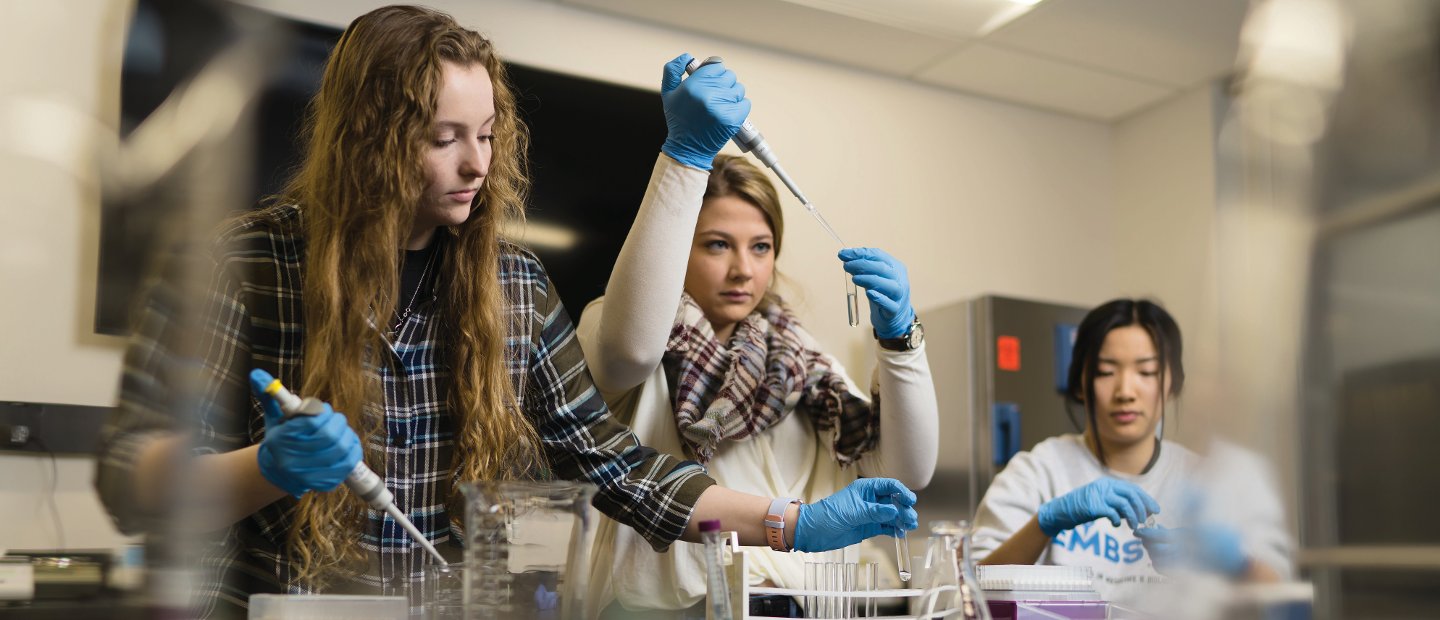
Bioengineering
Bioengineering is an emerging interdisciplinary field that is based on the increasing symbiosis between the biological sciences and engineering disciplines. Evolution in engineering technology and scientific knowledge resulted in new specializations in the workforce, including bioinformatics, computational biology, biomedical imaging, bio-instrument and sensor technology, tissue engineering, bionics, genetic engineering, and MEMS-based diagnosis and drug delivery. Training in Bioengineering provides the necessary foundations in the life sciences and in engineering, along with more focused training in one of five areas of specialty.
The B.S. in Bioengineering program is accredited by the Engineering Accreditation Commission of ABET, https://www.abet.org, under the General Criteria and the Bioengineering Program Criteria.
Program Overview Course RequirementsDirectoryResearchApply Now
Contact
Shailesh Lal, Ph.D.
Professor and Chair
Dodge Hall, Room 346
(248)370-2875
[email protected]
The interdisciplinary program in Bioengineering, offered jointly by the School of Engineering and Computer Science and the College of Arts and Sciences, leads to the Bachelor of Science degree. It combines training in biology with depth in either computation or engineering. Students should be capable of handling calculus-level math and physics, comprehensive chemistry and advanced-level biological sciences. Students can enroll into the program at any phase of their college experience. In particular, the program is designed so that the undecided engineering or sciences student can start by taking the core classes before committing to Bioengineering.
To earn the degree of Bachelor of Science with a major in Bioengineering, students must complete 129 credit hours; 32 of these credits must be at 3000-level or above. The first two years of the program mainly include foundations in the sciences and engineering, while the specialized courses are offered in the third and fourth years.
Career paths include:
- Cellular, Genetic and Tissue Engineering
- Clinical, Rehabilitation and Orthopedic Engineering
- Bioinformatics and Computational Biology
- Bioprocess Design and Drug Manufacturing
- Biomedical Imaging
- Bioinstrumentation and Biosensors
- Biomaterials and Biomechanics
- Environmental Engineering
For more information, contact Academic Advising.
The Bioengineering External Advisory Board assists the department in enhancing its programs and ensuring their relevance to current and emerging technological needs.
Industry Partners
Yansong Chen, Ph.D., Vice President, Organizational Transformation, Ricardo, Inc.
David Gallagher, Biometrics Research & Development, Lear, Inc.
Natalie Jameson-Kiesling, Ph.D., Associate Director of Research, Progenity, Inc.
Jack L. Jensen, Vice President, Humanetics Innovative Solutions, Inc.
Avinash Konkani, Ph.D., Biomedical/Clinical Engineer, Human Factor and Systems Engineer, HTM: Food and Drug Administration*
(*Dr. Konkani works in a personal capacity and does not represent the opinions of the Food and Drug Administration, the Department of Health and Human Services, nor the Federal Government.)
Francesco Migneco, MD, R&D and Product Development Manager, Lear, Inc.
Mida Pezeshkian, Ph.D., Founder, STEMA_cg
Stephen Rapundalo, Ph.D., President & CEO, Michigan Biosciences Industry Association
Ex-Officio Members
Louay Chamra, Ph.D., Dean, School of Engineering & Computer Science
Amy Banes-Berceli, Ph.D., Associate Dean, College of Arts & Sciences
Shailesh Lal, Ph.D., Chair, Bioengineering Department, School of Engineering & Computer Science
Gerard Madlambayan, Ph.D., Associate Professor, Bioengineering, School of Engineering & Computer Science
Jia Li, Ph.D., Professor, Bioengineering, School of Engineering & Computer Science
Dayna Neef, MPA, Corporate & Foundation Relations Officer, School of Engineering & Computer Science
The Summer Undergraduate Research Program in Bioengineering for Summer 2023 is currently accepting applications through April 10th.
The Summer Research Program is a unique opportunity to conduct independent research projects. Under the guidance of a BE faculty member, students will gain experience in the methods of scientific research, with the goal of exposing talented undergraduate students to the practices of a professional scientific career. At the conclusion of the program, students will demonstrate improved technical, critical thinking and communication skills.
Guidelines:
- Students must have at least a 2.8 cumulative GPA to be eligible for the program and be registered at Oakland University at least part-time (6 credits) for the Winter 2023 semester and at least part-time for the Fall 2023.
- The Summer Research Program is a 12-week program during the summer of 2023.
- Students will work one-on-one with a BE faculty member/Principal Investigator (PI) on a research project in a laboratory setting.
- Students are encouraged to take no more than one course during the summer 2023 semester. Any plans to take summer classes must be approved by the advising PI, as coursework may interfere with participation in the program.
- Awardees are expected to work 30 hrs/week, but not more than 40 hrs/wk for the duration of the program. The total time commitment for the 12 weeks is 405 hours for the amount of $4,250. Awardees will be paid by the hour.
- All students will participate in a symposium at the end of the program and provide a short presentation based upon their research project. Students are also required to participate in bi-weekly seminars throughout the duration of the program.
- Awardees are also encouraged to continue with their research project during the academic year.
Application Process:
Fill out an application
- Answer all questions
- Include a brief resume
- Request a letter of recommendation (only one) from someone who can attest to your scientific interest and aptitude.
Letters of recommendation must be sent directly from the source to [email protected] Letters of recommendation will not be accepted if submitted by the applicant. All completed applications must be submitted via email to [email protected]
Deadline: April 10, 2023 Notification of Acceptance: by April 14, 2023.
Any questions can be submitted via email to [email protected].